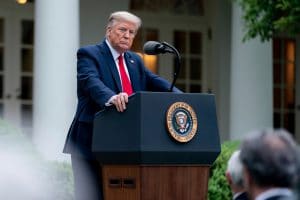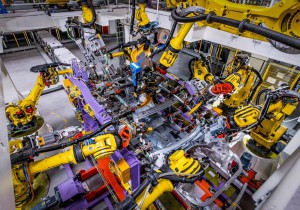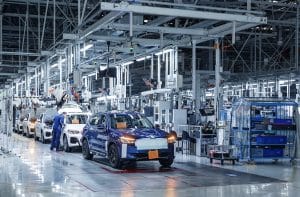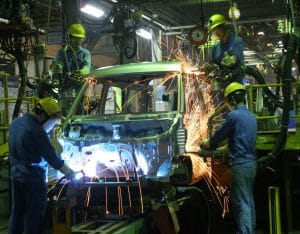
President Donald Trump claims trade wars are easy to win, but the long, drawn out battle with China has shown otherwise.
Donald Trump likes to say that trade wars are “easy to win,” but you’d have a hard time convincing anyone in the American auto industry, especially when it comes to the ongoing trade dispute between the U.S. and China.
Three years in, there’s been no resolution but plenty of collateral damage that, if anything, has cost American automotive jobs and exports. Tit-for-tat tariffs on American-made vehicles have made them increasingly non-competitive, according to industry analysts, forcing manufacturers like GM, Ford, BMW and Mercedes-Benz to turn to local Chinese sourcing, reducing exports to what is now the world’s largest automotive market.
Even though the president has now raised the prospect of offering tax incentives to manufacturers like GM, industry experts fear the damage could be long-term, perhaps permanent, with little likelihood vehicle production that has shifted from the U.S. to China will ever return.
(Trump threatens EU with car tariffs again.)
“Vehicles previously exported from (the U.S.) to China are now being relocated there,” said Joe Langley, the associate director of automotive research for IHS Markit, during a meeting of the Automotive Press Association.
The auto industry has repeatedly found itself in the cross hairs as Trump has launched or threatened trade wars with Mexico, Canada, Japan, South Korea and Europe. But not battle has proven so costly as the one with China which almost immediately led to punishing tariffs on both sides of the Pacific. During a brief respite, the Chinese pulled back on those duties. But an extra 25% tariff on an American-made vehicles, and 5% on imported U.S. auto parts, were reenacted last December when what seemed like a possible détente between the two countries fell apart.
The impact has been significant and obvious. The U.S. exported 192,210 vehicles to China in 2019, according to U.S. government data, up from the 163,618 shipped there the year before – but down from 262,483 in 2017 when the trade war was just getting underway. The record was set under President Barack Obama in 2014 when American plants provided 314,580 vehicles for the Chinese market.
The list of automakers shipping vehicles to China includes domestics Ford, General Motors and Fiat Chrysler. But among those hardest hit are two German manufacturers, Daimler AG, parent of Mercedes, and BMW, the two together exporting over 100,000 American-made crossovers to China last year.
The Bavarian automaker operates a sprawling assembly plant in Spartanburg, South Carolina that has long been the sole global source for its widely popular X5 sport-utility vehicle, as well as smaller models like the X2 and X3. But it added production of the X5 at a plant in Thailand last December, primarily to service the Chinese market. And production of that model and others now produced in the U.S. are widely expected to shift directly into China over the next several years.
“If the tariffs undermine the competitiveness of BMW production and sales in the US, the result could be strongly reduced export volumes with negative effects on investments and jobs in the US,” BMW spokesperson Kenn Sparks told trade publication Automotive News.
(Trump threatens tariffs as gasoline prices waver in face of pandemic.)
There is more room to swallow tariffs on a high-priced BMW than on a mainstream model from the likes of Ford which saw exports to China plunge by roughly a third for models like its Mustang sports coupe and Explorer SUV last year. But in an increasingly crowded and competitive market, even high-line offerings are vulnerable – one reason Ford has been expanding Chinese production of models from its Lincoln brand, rather than continuing to rely on U.S. plants.
While automakers might circumvent tariffs by adding Chinese production, that approach can add significant costs, anyway. Automakers like to “single source” vehicles, where possible, to maximize economies of scale, said David Cole, director-emeritus of the Center for Automotive Research. But “if you have multiple plants producing the same model, you lose those economies of scale.”
Cole agreed that the trade wars have, so far, yielded no benefit for the U.S. auto industry, though “any forecast” about how things might eventually shake out “is difficult to make until we see greater stability” in a global economy dealing not only with trade wars by a pandemic.
What is particularly worrisome, said IHS Markit analyst Langley, is that the pandemic will result in about a 20% reduction in global vehicle sales this year and could take years before the industry fully recovers. In the meantime, he anticipated a worldwide “realignment” of manufacturing capacity that could hit the U.S. industry hard.
With no sign that his tough talk is bending Chinese will, the president has decided to look back to the U.S., dangling a carrot before manufacturers like GM and Ford.
“We will create tax credits for companies that bring jobs from China back to America,” he announced in a speech this earlier this month. “We built the greatest economy in the history of the world and now I have to do it again.”
Asked about the possibility of shifting production back, GM said in an e-mailed statement that won’t happen. “Our operations (in China) are joint ventures with local companies that overwhelmingly produce vehicles for the domestic Chinese market. We do repatriate the equity income we earn in China back to the United States, where it is subject to tax.”
(UAW blasts Trump trade deal with China, skeptical about USMCA.)
While other U.S. automakers did not yet respond they have, if anything, been expanding investments in China hoping to maintain or expand business in the world’s largest car market – an increasingly difficult challenge as that country’s own domestic manufacturers grow. Tesla, for one, opened its first foreign plant – and only its second assembly line anywhere – late last year in China. With the Beijing government pushing for a shift to electric vehicles to address the country’s endemic air pollution, Tesla expects that market to become one of its most important going forward.
(Portions of this story first appeared on NBCNews.com.)




U.S. Losing Auto Jobs as Trump’s Trade War With China Drags On – This is a very misleading headline. This is not Trump’s War, rather it is a war for the very survival of US manufacturing and our quality of life. I find this kind of article very disingenuous and hurtful. You are clearly not trying to do the right thing for Americans.
I find your comment very misleading and wrong-headed, Mike. You confuse reporting with commentary. The question is not whether the U.S. should — or should not — be engaging China in a trade war but whether, if the U.S. does engage, there is a clear goal and an effective strategy. Simply saying the U.S. needs to bring manufacturing jobs back is only a vague goal and in no way a strategy. The fact that the president declared “trade wars are easy to win” but, three years later, nothing of positive substance has alarmed many experts and many in U.S. manufacturing. Indeed, what I found before starting this story, and then in doing this reporting, is that concerns about the administration’s handling of the trade war is completely bipartisan.
What is worse, and what you seem to be trying to either ignore or wish away is that the exact opposite of the stated goal has been happening. Certainly, in the auto industry I focused on, there has been little to no evidence of any manufacturing returning to the U.S. Quite the contrary…which is the centerpiece of the story…we are seeing some automotive manufacturing, along with jobs, LEAVE the U.S. for China. In other instances, the tariffs imposed on U.S. imports have reduced Chinese demand for American automotive goods, both parts and vehicles, resulting in lower production and, again, a loss of jobs.
So, the headline is accurate. What was promised to be an “easy” and quick trade war is entering its fourth year. The administration has acknowledged there is no clear path to resolving matters. Beyond that, not only has the trade war failed to bring jobs back but it is costing jobs and losing some manufacturing to China. Add to all that the fact that tariffs on many Chinese-made goods are a de facto tax hike driving up costs for American consumers.
There has no progress, there is no end in sight, and even if one does believe we must take a tougher stance on China trade, the results have been completely negative to date.
Finally, my job is not boosterism. It is to present facts and perspective.
Paul A. Eisenstein
Publisher, TheDetroitBureau.com